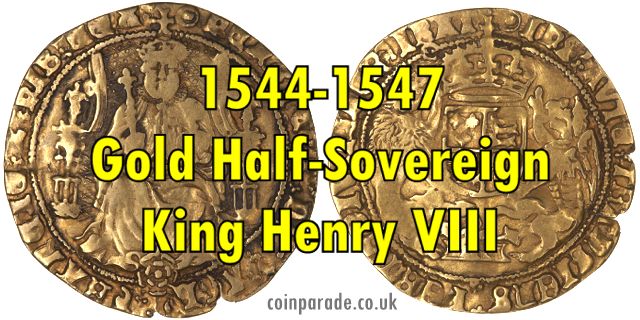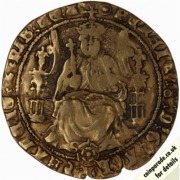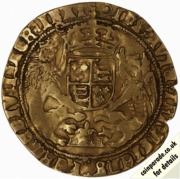
 The 1544-1547 Gold Half-Sovereign - Henry VIII
The 1544-1547 Gold Half-Sovereign - Henry VIIIHenry VIII gold half-sovereign minted between 1544 and 1547 at the Tower (London) mint. Third coinage (1544-47, the start of the debasement). Diameter 30mm, weighs around 5.25g. SCBC 2294. North: 1827.
This half-sovereign would have been minted at the Tower Mint (London), Southwark mint (mint mark 'S' or curved 'E') or Bristol Mint (mint mark 'WS'). Several minor varieties.
The Obverse shows the King sitting on a throne holding a sceptre and globe, rose at his feet. Legend around around, "HENRIC 8 D G AGL FRANCIE Z HIB REX". Mint mark is pellet in annulet.
 The Reverse shows a crowned royal shield quartered with the arms of England and France, supported by a lion and dragon. monogrammed "HR" below. Legend is "IHS AVTE TRANSIENS PERMEDIV ILLOR IBAT" (meaning But Jesus, passing through the midst of them, went His way). Mint mark is pellet in annulet.
The Reverse shows a crowned royal shield quartered with the arms of England and France, supported by a lion and dragon. monogrammed "HR" below. Legend is "IHS AVTE TRANSIENS PERMEDIV ILLOR IBAT" (meaning But Jesus, passing through the midst of them, went His way). Mint mark is pellet in annulet.Image credit: Museums Victoria
Mintage: Not known
Minted at The Royal Mint
Below are some coins currently being offered on eBay. As an eBay Partner, We may be compensated if you make a purchase.
Henry VIII was born in 28 June 1491, his parents being King Henry VII of England, Elizabeth of York. He became King in 1509 aged just seventeen.
Henry was well educated and athletic, standing six feet tall. Henry liked to have his own way and could ruthlessly enforce it, and in doing so blew the fortune left him by his Father. He split with the Pope who didn't allow him to divorce, leading the King to become the head of the Church of England. He built a large Navy and heavily debased the currency.
Henry VIII is perhaps most well know for having six wives: Catherine of Aragon (m. 1509; ann. 1533); Anne Boleyn (m. 1533; ann. 1536); Jane Seymour (m. 1536; d. 1537); Anne of Cleves (m. 1540; ann. 1540); Catherine Howard (m. 1540; d. 1542); and Catherine Parr (m. 1543).
Three of Henry's children had a turn on the throne: Edward VI, Mary I, and Elizabeth I.
The Half-Sovereign wa introduced a long time ago, in 1544 during the reign of Henry VII. However it was discontinued in 1604 (along with full sovereigns) and no more were minted until 1817. Production ended again in 1926 (1933 in Australia) and except for a few special issues during the Coronation years, it was 1980 when we saw half-sovereigns again.
As the value is half of one sovereign, that gives the half-sovereign a face value of half a pound or ten shillings - 50p in post-decimal money, although you're going to have to pay somewhat over the gold price if you want to buy one.
The Obverse is the Monarch's head (Henry VIII) and on modern half-sovereigns the Reverse is most often St George and the Dragon (usually the Benedetto Pistrucci version), although other backs have been used.
Specifications for 1544-1547 Gold Half-Sovereign - Henry VIII
- Weight: 3.99 g
- Diameter: 19.30 mm
- Thickness: 0.99 mm
- Purity: 22 carat = 91.67% (11/12ths gold, 1/12th copper. Adding copper makes the coin more scratch and dent resistant)
- Gold Content: 3.6575 g = 0.1176 troy ounce
- Face value: £0.50 = 10 shillings (decimal: 50 pence)
- Monarch: Henry VIII
- These specifications apply to half-sovereigns from 1817.
History
Up until 1604 there was a coin called the English gold sovereign and in 1816 when there was the "Great Recoinage" the name was revived. At that time standard gold (22 carat) was valued at £46 14s 6d per troy pound; this meant a £1 coin needed to weigh 123.2744783 grains or 7.988030269 g. The weight is still the same today.
As a historical note: to maintain the Gold Standard, in 1816 the value of silver was set at 66 shillings for one troy pound and silver coins were only legal for denominations up to £2. The diameter of a half-sovereign is 19.3mm and is only slightly smaller than a full sovereign (22.05mm) so first appearance may confuse inexperienced buyers. You can see in the image on the right, the half-sovereign on the right hand side is quite similar to the full sovereign on the left.
The diameter of a half-sovereign is 19.3mm and is only slightly smaller than a full sovereign (22.05mm) so first appearance may confuse inexperienced buyers. You can see in the image on the right, the half-sovereign on the right hand side is quite similar to the full sovereign on the left.
While you can buy half-sovereigns, many collectors only own them as part of a set.
Formed in the reign of Alfred the Great about the year 886, during the period 1279-1812 it was generally referred to as The Tower Mint as it was housed at the Tower of London. The Master of The Royal Mint has included famous figures such as Sir Isaac Newton.
Since 2010 it has operated as Royal Mint Ltd, a company owned by HM Treasury, under an exclusive contract to supply all coinage for the UK although it also produces medals and coins for other countries. It is currently located at Llantrisant, Wales.
The orignal coinage was Pounds, Shillings and Pence but since decimalisation on 15 February 1971, it is £1 = 100p, that is One Pound = 100 pence. The coinage of the UK is also a long history, the Royal Mint being established as long ago as 886AD when coins were hammered. Today there is perhaps 30 billion coins in circulation, and many (numismatic) collectors coins and sets are issued frequently in gold, silver and other metals.
As an eBay Partner, We may be compensated if you make a purchase.





